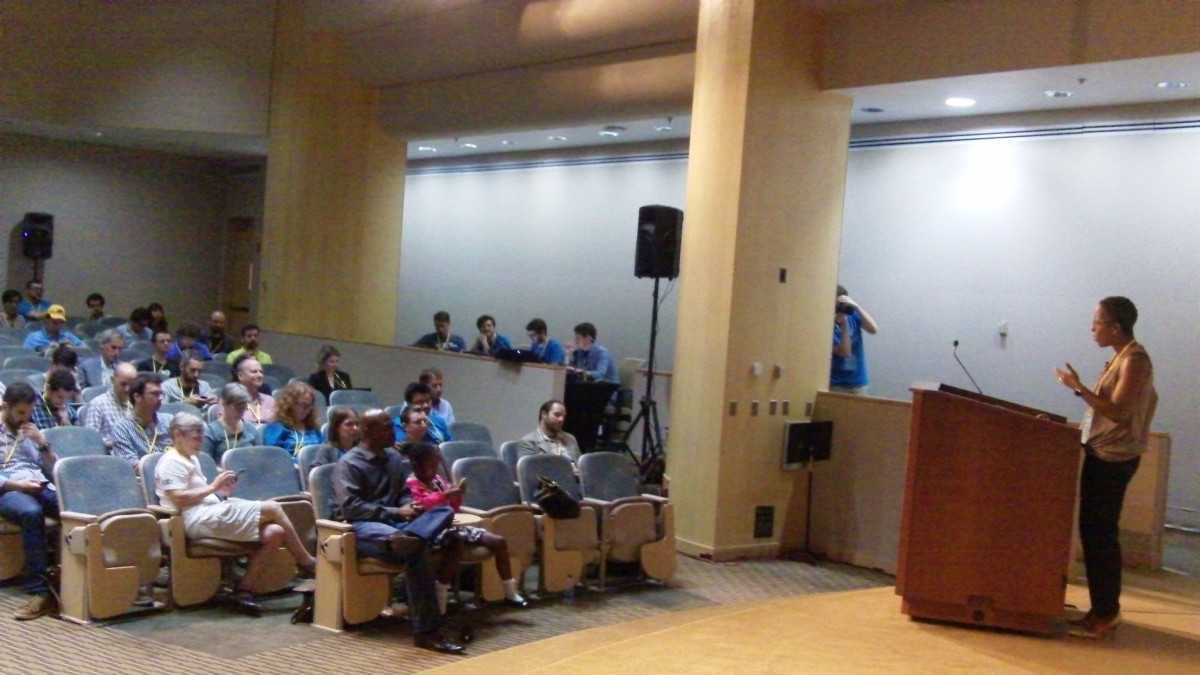The keynote speaker at the Sunlight Foundation’s eighth TransparencyCamp was unapologetically critical of the District’s open government record. She was also on its payroll.
On Saturday, Traci L. Hughes, D.C.’s very first Office of Open Government director, delivered a humorous, if at time scathing, recollection of her journey to the position.
“I have a confession for you. I do not speak tech, and I don’t code,” she began.
Hughes was formed as a lawyer, and went on to work in journalism and communications, eventually landing the position of head of communications at D.C.’s Metropolitan Police Department.
“I was also in charge of the FOIA requests that were coming through,” she said. “Well over 1,000 a year.”
With a skeleton crew — including a couple of rotating injured officers — she worked to sweep up the backlog, process new requests and make the system more efficient.
At the time, she said, MPD was “routinely sued” and “routinely lost” on charges that it had failed to comply with FOIA stipulations, costing the agency hundreds of thousands of dollars per year in legal costs.
“In the common vernacular,” said Hughes, “It was really — like, literally — a hot mess.”
"Thankyou for pushing the boundaries of democracy." Closing thoughts by @hughestraci @DCOPENGOV #TCamp15 pic.twitter.com/2DIvga0d07
— Open Contracting Partnership (@opencontracting) September 12, 2015
So she tried invoking (at the time) new e-discovery tools, guided by the principle that “creative thinking changes the boundaries of government.”
That didn’t work out the way she had hoped.
“I was, shall I say, invited to leave a year later,” she said.
In 2011, under the weight of a staggering number of corruption probes targeting D.C.’s elected officials, Council voted to create a Board of Ethics and Government Accountability (BEGA).
Former Mayor Vincent Gray went through the motions of supporting transparency, eventually creating the Office of Open Government under the purview of BEGA.
Hughes, who was then serving on the board the D.C. Open Government Coalition, was tapped to direct the new office.
“Hell no!” was her first reaction, she said.
But, though she had forsworn stepping foot in any government office “unless it was the DMV,” Hughes eventually accepted the job.
Today, she concluded, everything is not perfect — “the Office of Open Government is very much just chugging along.”
But some progress has been made:
- 67 of the District’s 90 agencies have joined the central FOIA portal.
- The District’s data warehouse has been updated.
- There’s a centralized calendar for all board and commissions meetings
- Nearly 11,000 residents have looked up the District’s legal code on DCDecoded.org since the website was launched last year.
- Last year, Councilman David Grosso opened up three pieces of legislation — including an urban farming bill — to public comment on the OpenGov Foundation’s Madison platform.
Speaking inside the Kellogg Conference Hotel at Gallaudet University, Hughes faced a crowd of sympathizers.
Throughout the day, about 300 open gov activists from across the country — and even from Ukraine and Argentina — basked in the openness of an unconference-style event that once served as backdrop to the early organizing for Code for America.
“The schedule was slotted on site,” said communications director Jenn Topper. “We gave them rooms and let the community come to them.”
Workshops on design and how to navigate the websites of state legislatures were topped off with more introspective discussions on the nature of open government — and even a few oddball musings.
Before you go...
Please consider supporting Technical.ly to keep our independent journalism strong. Unlike most business-focused media outlets, we don’t have a paywall. Instead, we count on your personal and organizational support.
3 ways to support our work:- Contribute to the Journalism Fund. Charitable giving ensures our information remains free and accessible for residents to discover workforce programs and entrepreneurship pathways. This includes philanthropic grants and individual tax-deductible donations from readers like you.
- Use our Preferred Partners. Our directory of vetted providers offers high-quality recommendations for services our readers need, and each referral supports our journalism.
- Use our services. If you need entrepreneurs and tech leaders to buy your services, are seeking technologists to hire or want more professionals to know about your ecosystem, Technical.ly has the biggest and most engaged audience in the mid-Atlantic. We help companies tell their stories and answer big questions to meet and serve our community.
Join our growing Slack community
Join 5,000 tech professionals and entrepreneurs in our community Slack today!

The person charged in the UnitedHealthcare CEO shooting had a ton of tech connections

From rejection to innovation: How I built a tool to beat AI hiring algorithms at their own game

Where are the country’s most vibrant tech and startup communities?


